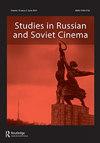Notes toward an untimely Soviet comedy: Eisenstein’s MMM
IF 0.4
0 FILM, RADIO, TELEVISION
引用次数: 0
Abstract
ABSTRACT Between 1932 and 1933, in the context of a new mandate for cheerfulness in Soviet cinema, Sergei Eisenstein, recently returned from a frustrating sojourn abroad, undertook an exercise in genre: the beguilingly titled comedy MMM. The project, which was never completed, has been almost completely overlooked in studies of the director’s works. Against this tendency of Eisenstein scholarship, this paper presents MMM as a serious and highly developed experiment in genre, using archival material – including notes, screenplays, director’s scripts and drawings – to read the work as an expression of Eisenstein’s cinematic process at its most formally inventive and ideologically intricate. The script, composed entirely in verse, is the director’s only fully-conceived attempt at film comedy. It follows a sprawling series of incongruous historical encounters as visitors from medieval Rus’ materialise in contemporary Moscow. The absurd fantasia that ensues is not only Eisenstein’s attempt to probe an increasingly ideologically unstable Soviet reality, but is also his occasion to explore, through self-reflexive comedic techniques, the nature and limits of the cinematic medium, as well as the theoretical question of the mutability of static form and the implications of this conundrum for character, narrative and genre.不合时宜的苏联喜剧:爱森斯坦的《MMM》
1932年至1933年间,在苏联电影“欢乐”的新时代背景下,谢尔盖·爱森斯坦(Sergei Eisenstein)最近刚从令人沮丧的国外逗留回来,他进行了一项类型试验:名为《MMM》的喜剧。这个从未完成的项目,在对导演作品的研究中几乎完全被忽视了。与爱森斯坦学者的这种倾向相反,本文将《MMM》作为一种严肃的、高度发展的流派实验,使用档案材料——包括笔记、剧本、导演剧本和图纸——将这部作品解读为爱森斯坦电影过程中最具创造性和最复杂的意识形态的表达。剧本完全由诗歌组成,是导演在电影喜剧方面唯一一次完整构思的尝试。它讲述了中世纪俄罗斯游客在当代莫斯科的一系列不协调的历史遭遇。接下来的荒诞幻想不仅是爱森斯坦试图探索意识形态日益不稳定的苏联现实的尝试,也是他通过自我反思的喜剧技巧探索电影媒介的本质和局限性的机会,以及静态形式可变性的理论问题,以及这一难题对角色、叙事和类型的影响。
本文章由计算机程序翻译,如有差异,请以英文原文为准。
求助全文
约1分钟内获得全文
求助全文

 求助内容:
求助内容: 应助结果提醒方式:
应助结果提醒方式:


